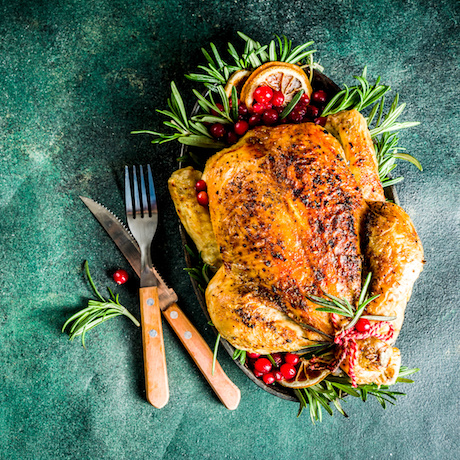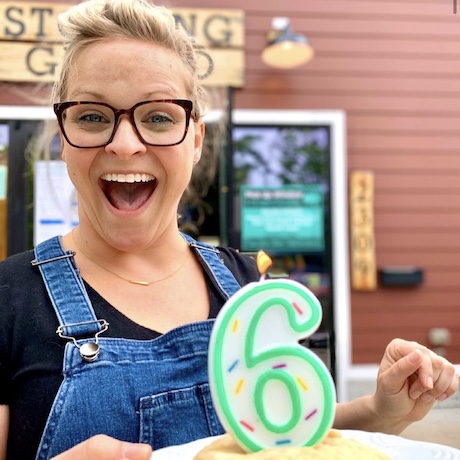Why You Should Buy and How to Cook a Heritage Turkey for Thanksgiving

Traditional Christmas and Thanksgiving roasted whole chicken with fruit and rosemary. Dark green concrete table top view copy space
Last week at the Shoe Hive’s Holiday Pop-Up we did a tasting of our Thanksgiving Take N’ Bake sides and pies (you have until Friday to get your orders in online). The questions I received again and again were, “Where should I get my turkey?” and “What is the best way to cook the turkey?” My answer is almost always the same: buy a pasture raised, heritage turkey, and don’t muck it up when you roast it.

In an inadequately simple, Cliff’s Notes version, here is why you should source your turkey from a farmer this year. When we talk about Heritage, or Standard Breed animals, we are talking about historical breeds — the breeds our ancestors ate before factory farming came in and “standardized” the meat we eat. Why is this important? When you buy a supermarket turkey, (let’s say a bird from the brand that rhymes with word basketball) that turkey breed is called “Broad Breasted White.” It is a breed created by scientists at the USDA for maximum meat producing efficiency and cheap price tags. They are less tasty, bad for the environment and live terrible lives. Heritage animals typically have more active lifestyles and take longer to grow to full size producing more flavorful, rich tasting meat (the more active the animal, the more flavor in the muscles). Conversely, conventional turkeys live in close quarters and are bred to grow so top heavy so quickly that they often struggle to walk and therefore do not develop delicious meat. In short, if you don’t care about farming, the environment, etc. buy a Heritage Turkey because it tastes better. A Google search will direct you to local farmers that can source for you. Try Let’s Meat on the Avenue or Whiffletree Farms to get started.

After you source your bird, here are a few tips to best care for your investment:
1. Defrost the turkey in the refrigerator, it will need one day of defrosting for every four pounds of turkey. If you plan on brining your bird the night before the big day, and you should, start thawing that 12-pound bird on Sunday. If you don’t thaw it in time, send me an email and I can help you out.
2. Yes, brine your turkey. One to two days before serving, rinse turkey and pat dry. Rub all over with kosher salt, slipping salt under skin where possible and rubbing some into cavities. Use about 1 tablespoon per 4 pounds of bird. Wrap bird in a large plastic bag and place in refrigerator. On second night or halfway through the day, turn turkey over.
3. Pull your turkey out first thing in the morning and let it come to room temperature. Pat it super dry. I rub mine down generously with Duke’s Mayo (yes really) as I find it produces a crispier skin than any other coating. I stuff the inside with herbs, truss (to keep the legs in tight) and put in a 375-degree oven.
4. During cooking, don’t baste. It just runs off the turkey, makes the skin weird, and it makes you open and close the door too often, slowing down how long it takes to cook the dang thing in the first place.
5. Remove the bird from the oven when the breast temp reaches 165 degrees and the thighs (thickest part) are at 173 degrees. If you wait until it reads 178 degrees, you will have a dry turkey. Also, just because a slice of turkey has a pinkish tint doesn’t necessarily mean it’s underdone. There is a chemical reaction with a prominent, myoglobin, and oxygen that will produce a pink color, even if the turkey is fully cooked. As long as the meat has registered the prescribed temperature on your thermometer, it’s perfectly safe to eat.
6. Most importantly the meat must rest at least thirty minutes or so. This gives it time to reabsorb the juices; otherwise they’ll dribble out when you slice, and the meat will be dry. Don’t tent the turkey with foil to keep it warm while it’s resting; it’s unnecessary and will make the skin soggy.
- About the restaurant
If you wander down Del Ray’s, “The Avenue,” you won’t miss the farm-red building with a rustic fence bordering the patio. Stomping Ground opened two years ago and quickly became popular for its made-from-scratch biscuits and its neighborhood vibe. On weekends, excited guests line up before Stomping Ground opens hoping to be the first to get a just-out-of-the-oven biscuit or a fresh salad. Stomping Ground is mostly known for its fast casual breakfast and lunch but on Thursdays and Fridays they provide a full dinner service after 5:00pm. All meals are built from local, seasonal food that is organic whenever possible.
2309 Mt Vernon Avenue
Alexandria, VA 22301
703.567.6616








